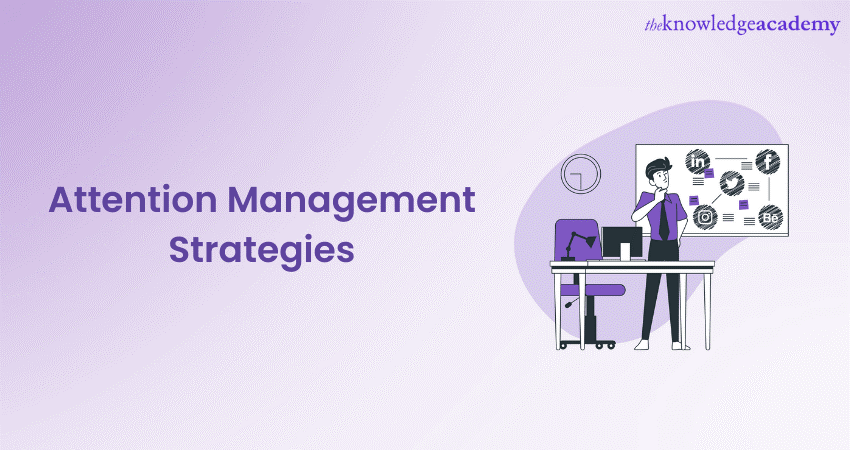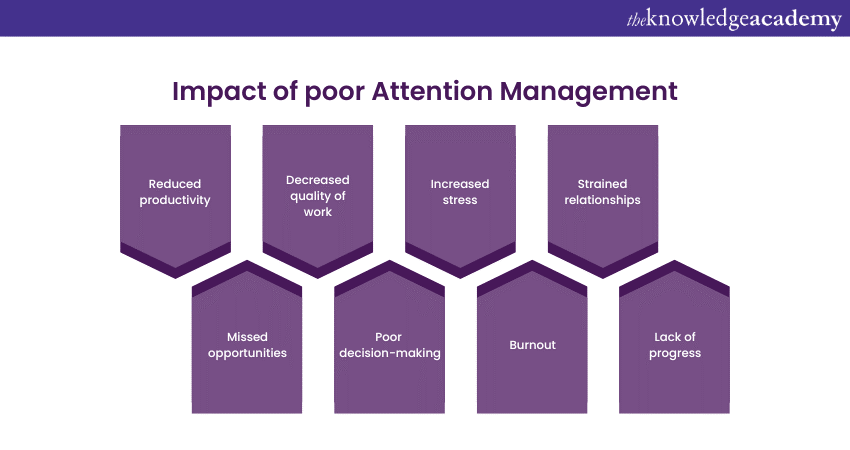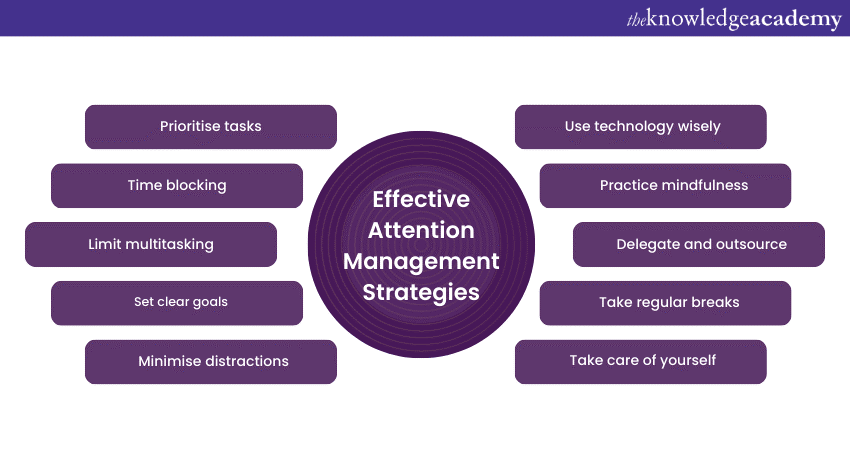We may not have the course you’re looking for. If you enquire or give us a call on +1 6474932992 and speak to our training experts, we may still be able to help with your training requirements.
Training Outcomes Within Your Budget!
We ensure quality, budget-alignment, and timely delivery by our expert instructors.

It is very common these days that our attention is constantly pulled in countless directions. From looking at smartphones to endless streams of information, maintaining focus has become a precious commodity. This is where Attention Management Strategies step in.
The biggest reason why employees waste time is their habit of internet surfing during work hours. This adversely affects their productivity. So, it’s time to discover effective Attention Management Strategies to boost focus and productivity in a distracted world. Reclaim your attention today!
Table of Contents
1) What is Attention Management?
2) The impact of poor Attention Management
3) Effective Attention Management Strategies
4) The role of Attention Management Strategies in personal growth
5) Conclusion
What is Attention Management?
Attention Management means focusing your mind and energy on the most important tasks while avoiding distractions and the stress of too much information. It's not just about finishing tasks; it's about doing them well and quickly. In a world full of notifications, emails, and social media, being good at Attention Management helps you think clearly and get the best outcomes.
Master your focus and time – Sign up now for our Attention Management Training!
The impact of poor Attention Management
When attention isn't managed well, it can have several negative effects on your work and life. Let's discuss the possible impact poor Attention Management can have in your life:

Reduced productivity
When you can't concentrate on one task at a time, your productivity suffers. Jumping between tasks means you take longer to finish them, and the quality of your work might not be up to par.
Decreased quality of work
Dividing your attention among multiple tasks means you might miss important details or make mistakes. Your work's quality might drop, leading to rework and extra stress.
Increased stress
Increased stress is a direct outcome of not handling your attention well. When you're always trying to do too many things at once or getting interrupted all the time, it makes you feel really overwhelmed.
It's like having too many tabs open on a computer – everything starts to slow down, and you might even feel like things are crashing. This constant busyness and lack of focus can make you feel tense, anxious, and even exhausted.
Strained relationships
If you're always distracted during conversations or spend time with loved ones while mentally focused on work, it can strain relationships. People want your full attention when you're with them.
Missed opportunities
Not being attentive can cause you to miss out on important opportunities, whether it's a chance to network, learn, or contribute to a project. To combat this, cultivating Attention Management skills is crucial. By honing the ability to concentrate on the present moment and the tasks at hand, you enhance your awareness of opportunities as they arise.
Poor decision-making
Poor decision-making is a significant consequence of inadequate Attention Management. When your focus is scattered and divided, your ability to make well-informed choices becomes compromised.
Decision-making requires careful consideration, evaluation of options, and weighing potential outcomes. However, when attention is constantly pulled in different directions, critical factors might be overlooked. This can lead to suboptimal decisions that can have far-reaching consequences.
Practice tough talks with confidence – Sign up for our Managing Difficult Conversations Training today!
Burnout
Burnout is a state of mental, emotional and physical exhaustion. When your attention is scattered across numerous tasks without proper breaks or focused downtime, you become susceptible to burnout. The constant demands on your cognitive resources without sufficient recovery can lead to feelings of chronic stress and a sense of detachment from both work and personal life.
Lack of progress
Lack of progress is a result of not managing your attention effectively. When you can't focus on one thing at a time or keep getting distracted, it's hard to clear your path towards the goals. Imagine trying to read a book while constantly checking your phone – you won't get very far in the book. The same thing happens with tasks and projects; if you can't give them your full attention, you'll struggle to make meaningful steps forward.
Missed details
When you don't manage our attention well, you can miss out on important details. Details are like the small pieces that make up the bigger picture. Imagine reading a book and not noticing some words – you might not understand the whole story. Similarly, when you are not paying good attention, you might not see or understand everything you're supposed to.
Reduced creativity
When attention is spread thin, the ability to be creative often suffers. Creativity involves coming up with new and interesting ideas, like finding exciting solutions to problems or thinking of imaginative ways to do things. However, when our focus is divided, our brain finds it harder to generate innovative thoughts.
Effective Attention Management Strategies
Strategies for effective Attention Management are like tools that help you stay focused and get things done. Here are some ways to make sure you are attentive:

Prioritise tasks
One of the effective Attention Management Strategies is prioritising tasks. Prioritising your daily tasks is like creating a roadmap for your day. Start by making a list of everything you need to do, then identify the tasks that are most important or have impending deadlines. These tasks go to the top of your list. By focusing on these high-priority items first, you ensure that your attention is directed towards activities that have the most impact.
Time blocking
Time blocking is about setting dedicated time slots for specific tasks. Allocate chunks of time to different activities. Moreover, ensure that each task gets your full attention during its designated period. This technique prevents the temptation to switch between tasks, which can disrupt your focus.
Limit multitasking
Contrary to popular belief, multitasking isn't efficient. It divides your attention and often results in lower quality work. Focusing on one task at a time allows you to give it your full cognitive resources, leading to better results. When you concentrate on a single task, you can think critically, solve challenges, and complete the task faster.
Set clear goals
Setting clear goals acts as a compass for your attention. When you start a task with a specific goal in mind, your attention becomes naturally directed towards achieving that goal. Goals create a sense of purpose and direction, motivating you to stay focused on the task at hand.
Minimise distractions
Distractions divert your attention from the task you're working on, making it harder to accomplish anything meaningful. Minimising distractions involves creating an environment that supports focused work. Turn off notifications on your devices, find a quiet and organised workspace, and set boundaries to limit interruptions.
Use technology wisely
Incorporating technology can enhance your Attention Management efforts. Utilise tools like timers or specialised apps, such as the Pomodoro Technique, which encourages focused work intervals followed by short breaks. These help to structure your time, maintaining a rhythm of productivity and rest.
Practice mindfulness
Mindfulness techniques, like deep breathing and meditation, are powerful Attention Management tools. Engaging in deep breathing exercises calms your mind and increases awareness of the present moment, making it easier to resist distractions.
Achieve your dreams with purpose – Sign up for the Motivation and Goal-Setting Training now!
Delegate and outsource
Recognising tasks that others can handle is one of the Attention Management Strategies. Delegating tasks that don't require your direct involvement frees your attention for more important responsibilities. Delegation optimises your time, elevates overall productivity, and fosters a sense of collaboration within teams or among family members.
Take regular breaks
Scheduled breaks might seem counterintuitive, but they're essential for maintaining high-quality attention. Short breaks, during which you step away from your work and engage in a different activity, recharge your mental resources. These intermissions prevent mental fatigue and restore your ability to focus effectively.
Take care of yourself
Self-care directly impacts Attention Management. A well-rested body supports a focused mind. Prioritise sufficient sleep, a balanced diet, and regular exercise. Sleep restores your cognitive functions, allowing you to maintain attention for longer periods. Proper nutrition provides the energy required for sustained focus.
The role of Attention Management Strategies in personal growth
Implementing Attention Management Strategies is vital in driving personal growth and development. They shape a path toward a more fulfilling and successful life. Here's how:
Enhanced learning and skill acquisition
When you allocate focused attention to learning new skills or acquiring knowledge, you accelerate your personal growth. Deep concentration enables better understanding and retention of information.
Creativity and innovation
Uninterrupted attention is crucial for creativity and innovative thinking. Deep focus allows your mind to explore different angles, connect ideas, and generate unique solutions to challenges. By immersing yourself in creative tasks without distractions, you create an environment that brings fresh ideas and inventive approaches.
Achieving deep work
Cal Newport introduced the term deep work to describe focused, distraction-free, and undistracted efforts on demanding tasks. Engaging in deep work enables you to produce high-quality outputs, whether it's writing, coding, or problem-solving. This intensive focus results in accomplishments that contribute significantly to personal and professional growth.
Nurturing work-life balance
When you focus on work during your work time and on personal things afterwards, you make room for personal growth beyond your job. This means spending time on hobbies you enjoy, taking care of yourself, and being with the people you care about. This balance helps you become better in different areas of life, not just work. By giving attention to both work and personal life, you create a more fulfilling and well-rounded journey of growth.
Sharpened decision-making
Effective Attention Management Strategies improve your decision-making abilities. Making decisions with undivided attention results in better choices aligning with your goals and values, driving personal growth in alignment with your aspirations.
Conclusion
By using Attention Management Strategies like focusing on tasks, staying away from distractions, and taking care of ourselves, we can excel at many things. This isn't just about work – it's about making our lives better overall. So, let's start using these tips today and see how they make our work, relationships, and personal growth even better.
Explore your potential with our transformative Personal Development Courses - Join now and thrive!
Frequently Asked Questions
Upcoming Business Skills Resources Batches & Dates
Date
 Attention Management Training
Attention Management Training
Fri 10th Jan 2025
Fri 14th Feb 2025
Fri 11th Apr 2025
Fri 23rd May 2025
Fri 8th Aug 2025
Fri 26th Sep 2025
Fri 21st Nov 2025







 Top Rated Course
Top Rated Course



 If you wish to make any changes to your course, please
If you wish to make any changes to your course, please


